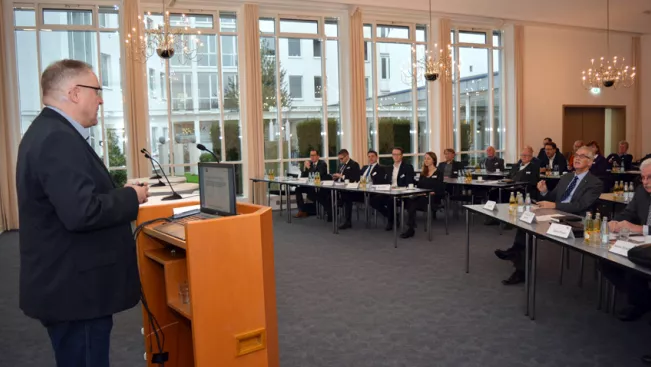Department of Engineering and Communication
Professor Braehmer at the Industry Dialogue

After violent disputes over lignite mining at the Hambacher Forst: Can companies of the raw materials industry communicate with the public and help to shape opinion? Should those companies operate active PR? If so, what does an appropriate communication strategy look like? What are the opportunities and risks?
Answers to these questions were given by Professor Dr. Uwe Braehmer from the Bonn-Rhein-Sieg University of Applied Sciences to the delegates of the panel "IHK- Branchendialog Rohstoffwirtschaft" (IHK Industry Dialogue Raw Material Economy) in Koblenz. In his presentation and a subsequent panel discussion with entrepreneurs and managers, he pleaded for a cross-media awareness campaign of the trade associations and the Hessian and Rhineland-Palatinate companies. "The stages from the raw material to the finished product are hardly manageable for laymen. This carries the danger of incomprehension or even distrust. Concise examples from everyday life should here be easily understandable illustrated," said Uwe Braehmer. Furthermore, the communication expert recommended an active dialogue of the companies on site. Operators of salt mines, stone and gravel pits, opencast of pumice, clay and minerals should invite citizens, politicians and the media to company visits.
The industry dialogue Raw Material Economy was opened by IHK CEO Arne Rössel. Under the moderation of IHK-referee Christian Jütte, undersecretary Andreas Tschauder from the Ministry of Economics Rhineland-Palatinate, Werner Heuser from Mineral Processing Stephan Schmidt KG, Doctor Matthias Schlotmann from the Federal Association of Ceramic Raw Materials and Industrial Minerals and Dorothea Kaleschke-Weingarten from the Association of the Construction and Natural Resources Industry with Uwe Braehmer on the podium and answered the plenary questions.
Hesse and Rhineland-Palatinate are home to numerous companies that extract raw materials in mining, open pit mining and recycling. This results in nutrients and fertilizers, building materials for home and garden, sanitary products for home or apartment, ceramic or clay tiles, enameled vessels or jewelry.
Contact Person: Christian Jütte, IHK Koblenz